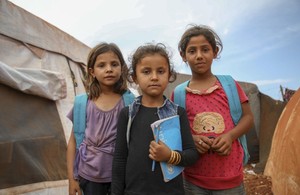UK pledges support for Syrians facing twin threat of conflict and coronavirus
International Development Secretary says the UK stands with Syrians and is providing life-saving support where it is most needed.

Syrian children in a camp for people displaced by conflict in Idlib, Syria. Picture: UNICEF
The UK will provide life-saving support to Syrians affected by their country’s ongoing conflict and the potentially devastating impact of coronavirus, International Development Secretary Anne-Marie Trevelyan announced at the ‘Supporting the Future of Syria and the Region’ pledging conference in Brussels today (Tuesday 30 June).
With only half of hospitals fully functioning and more than seven million people internally displaced, there remains a critical gap in basic healthcare alongside overcrowded living conditions – increasing the risk of coronavirus spreading.
The UK is pledging at least £300 million to support vulnerable Syrians with education, healthcare, food and economic recovery. The funding will help stop the spread of the virus by supporting health workers with training, medical supplies and sanitation. Preventing coronavirus in countries with weak health systems helps to protect us all – as no one is safe until we are all safe.
Speaking at the virtual conference the International Development Secretary Anne-Marie Trevelyan said:
The Syria Conflict has now run into its tenth year, and in this time, more than 500,000 people have been killed and more than 11 million Syrians have been uprooted from their homes, families, livelihoods and schools.
We cannot and will not ignore the scale of the coronavirus threat in Syria, which has already been ravaged by almost a decade of conflict. That is why the UK stands with the Syrian people and is providing life-saving support where it is most needed.
The Brussels conference is also raising funds to help countries in the region affected by the crisis, including Lebanon, Jordan and Turkey, which host over five million Syrian refugees.
UK funding will continue to help Syrian households recover from the crisis and become more self-reliant in the long-term. Over the past three years the UK has provided tools, training, and start-up funding to help Syrians in need across the country get a regular income. In her remarks, Ms Trevelyan said emergency humanitarian support was crucial, but the international community must also continue to help Syrians regain their livelihoods.
The UK is helping to ensure more than 500,000 of the most marginalised and at risk children receive a quality education in Syria. This work provides a sense of stability, safety and routine for Syrian children, a generation which has grown up in this conflict.
Humanitarian access to millions in need within Syria continues to be obstructed by the Syrian regime, which routinely refuses requests from the UN and aid organisations to deliver aid, prolonging suffering. It is essential that the UN Security Council Resolution on cross-border aid is renewed in July. The humanitarian situation in Northern Syria is dire, and humanitarian organisations must have unfettered access to help those in need.
The UK supports the UN-facilitated political process to reach a lasting settlement to the conflict which protects the rights of all Syrians. The UK will not consider providing any reconstruction assistance unless a credible, substantive and genuine political process is firmly underway.
Notes to editors
- In 2020, the UK will provide at least £300 million to the Syria Crisis, bringing our total support to over £3.3 billion since 2012. This funding has provided over 28 million food rations, over 19 million medical consultations, and over 13 million vaccines across the region.
- According to the latest OCHA update, the number of people confirmed by the Ministry of Health to have COVID-19 is: 269 (nine fatalities, 102 recovered). However, testing capacity remains low. There is high risk for the elderly, people with underlying health conditions, vulnerable refugee and IDP populations and healthcare workers.
- The Syrian Observatory for Human Rights estimates 586,100 people have been killed in the crisis since 2011. https://www.syriahr.com/en/157193/
General media queries (24 hours)
Email mediateam@dfid.gov.uk
Telephone 020 7023 0600
If you have an urgent media query, please email the DFID Media Team on mediateam@dfid.gov.uk in the first instance and we will respond as soon as possible.